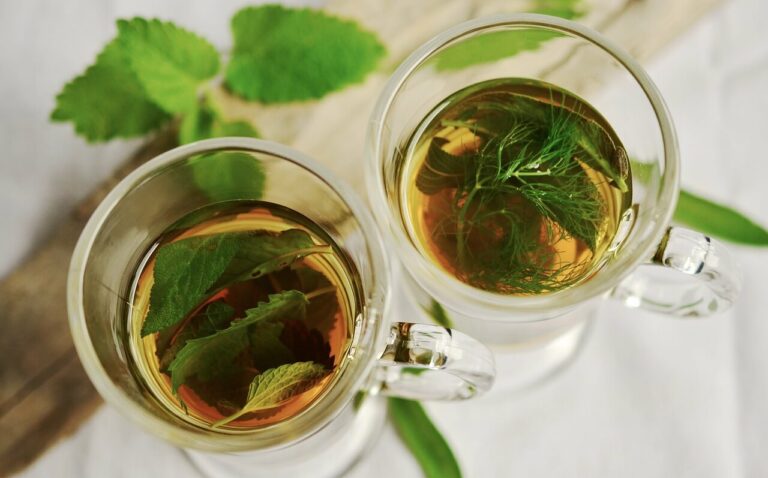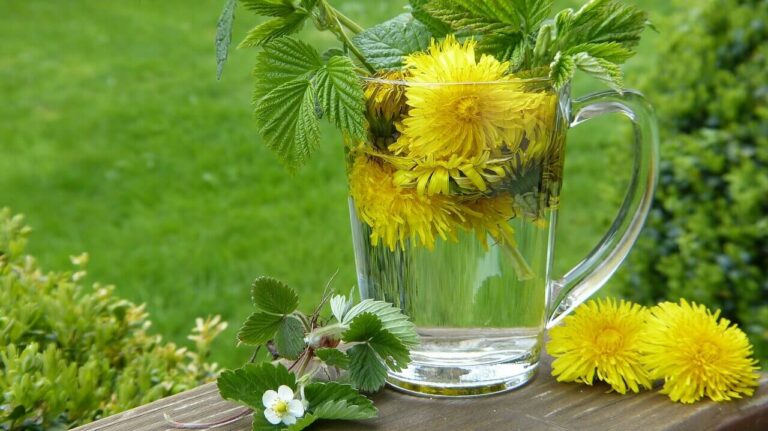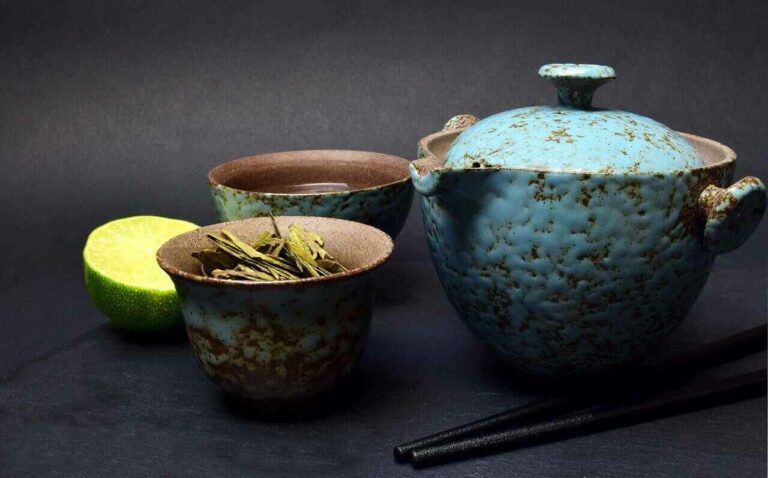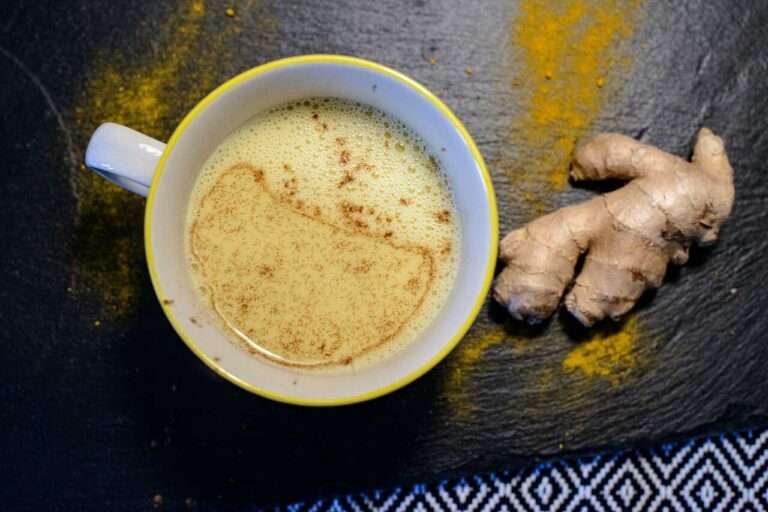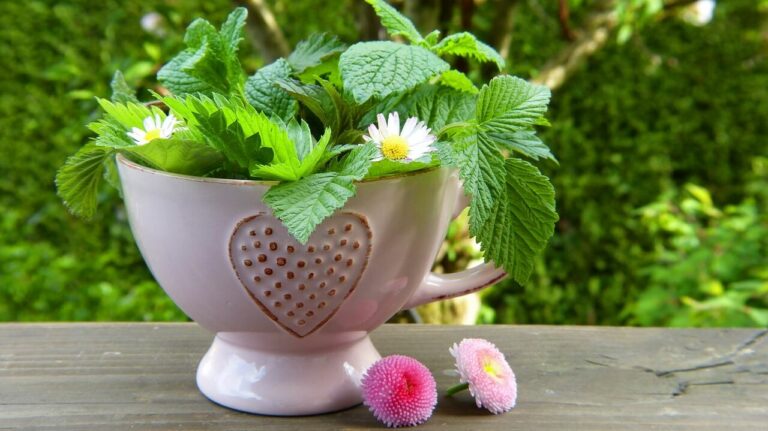7 Kidney Cleansing Teas That Promote Renal Health
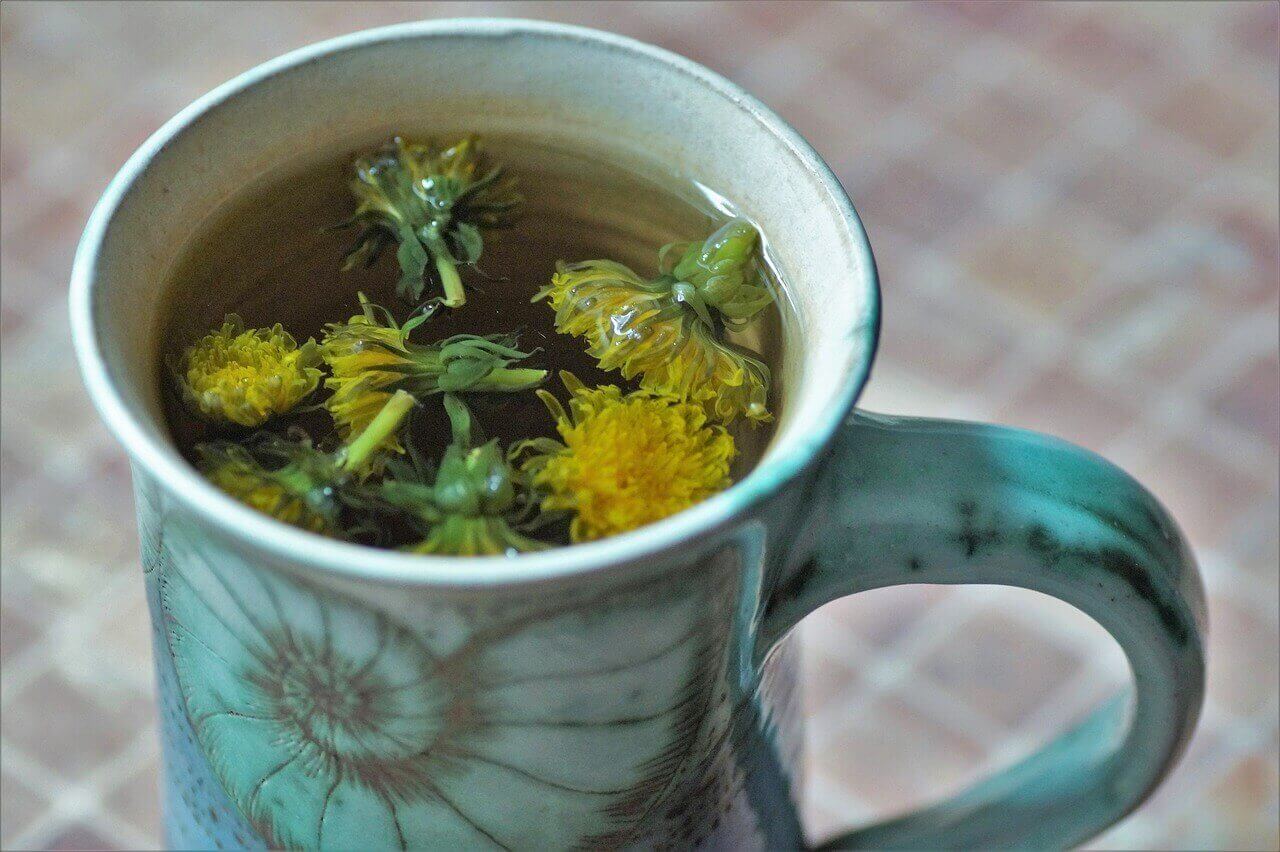
Amid prevailing lifestyle and dietary practices, the well-being of our kidneys often stands jeopardized, leading to ailments such as kidney stones and urinary tract infections.
In this scenario, many opt for a kidney cleanse or detox to keep their kidneys healthy.
This encompasses consuming certain substances, such as kidney cleanse tea or kidney tea, thought to aid in expelling calcium oxalate crystals (commonly linked with kidney stone formation) and other undesired substances from the kidneys.
This article will delve into some popular kidney-cleansing teas. However, it’s crucial to remember that these teas’ impacts are still under research, and any dietary or health changes should be embarked upon in consultation with healthcare professionals.
Contents
What Are Kidney Cleansing Teas?
Upon encountering the term ‘kidney cleansing teas,’ you might perceive it as the newest health trend or a traditional remedy. But what exactly do these teas entail, and how do they influence kidney health?
In essence, kidney cleansing teas are herbal infusions crafted from various botanicals, each boasting unique attributes that may support kidney health.
These teas don’t claim to be a miraculous treatment for kidney ailments or a substitute for prescribed medication. Instead, they could function as a complementary measure to help preserve a healthy kidney function.
The primary goal of these teas is to promote detoxification, assist the body in eliminating toxins, sustain equilibrium in the urinary tract, and essentially operate as gentle kidneys cleanse.
They offer a delightful and comforting method to potentially augment the health of your kidneys, which serve as the body’s natural filtration system.
Want to learn more, make sure to check our other posts on kidney health.
1. Dandelion Tea
Dandelion, viewed as a nuisance weed by some, is considered a medicinal boon by others. The plant’s leaves and roots are employed to concoct dandelion tea, traditionally hailed for various health boons.
What earmarks this tea as potentially beneficial for kidney health are its inherent diuretic traits. Diuretics increase the volume of water and salt expelled from the body through urine.
Hypothetically, by augmenting urine production, dandelion tea could assist the kidneys in purging excess water, sodium, and potentially harmful waste.
Amidst substantial fluid coursing through the kidneys, some people also experienced that calcium oxalate crystals decreased in concentration, a prevalent component of kidney stones.
By aiding in diluting this concentration, dandelion tea might lower the chances of these crystals conglomerating into stones.
Potential Side Effects and Interactions: Generally, dandelion is deemed safe for the majority. However, it can trigger allergic responses in those allergic to ragweed and similar plants. Furthermore, according to Web M.D., dandelions may interfere with certain medications, like diuretics, lithium, and drugs metabolized by the liver.
Preparation Tips: Creating dandelion tea requires the plant’s foliage or roots. If utilizing fresh dandelion, ensure it is free from pesticide treatment, preferably sourced from organic kidney-friendly farms. After rinsing and chopping the leaves or roots, employ 1-2 tablespoons for each cup of boiling water. Allow steeping for approximately 10 minutes before straining. Suppose employing dried dandelion, immerse 1-2 teaspoons in boiling water for the same duration.
2. Nettle Leaf Tea
Nettle leaf tea is derived from the leaves of the stinging nettle plant.
Like dandelion, nettle leaf boasts natural diuretic traits, which can enhance urine production and possibly facilitate the cleansing of the urinary tract.
The anti-inflammatory attributes of nettle tea, likely originating from its diverse plant compounds like flavonoids, could potentially aid in diminishing inflammation in the urinary system, further fortifying the overall health of the urinary tract and kidneys.
Potential Side Effects and Interactions: Nettle leaf tea is usually safe when consumed in moderate quantities but may upset some people’s stomachs. It could also interact with medications for blood pressure, diabetes, and diuretics.
Preparation Tips: The optimal way to prepare nettle leaf tea is with dried nettle leaves. Include 1-2 teaspoons of dried nettle leaves in a cup of boiling water. Let it steep for around 10 minutes before straining. Handle them with gloves to avoid stings and ensure thorough cleansing when using fresh nettle leaves. Utilize a handful of mint leaves for every cup of water.
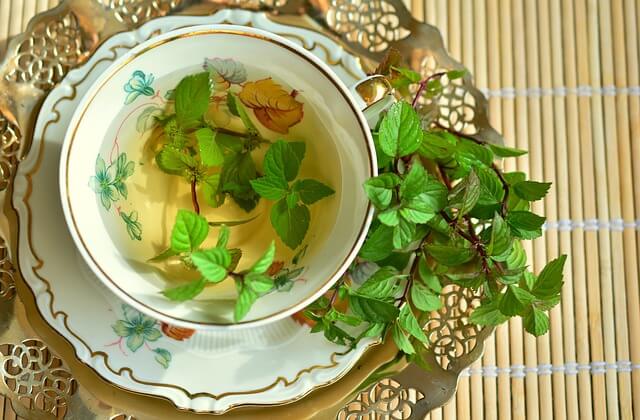
3. Peppermint Tea
Peppermint tea is a fragrant infusion crafted from peppermint leaves. Its primary active ingredient, menthol, is responsible for its characteristic cooling impact.
Regarding kidney health, the soothing influence of menthol on muscles could extend to the muscles in the urinary tract.
By relaxing these muscles, peppermint tea might alleviate the passage of kidney stones, an often agonizing process, thereby playing a role in kidney stone prevention. However, additional research is needed to comprehend this potential benefit fully.
Potential Side Effects and Interactions: While peppermint tea is typically well-tolerated, it might cause heartburn in specific individuals. It may also interact with medications that reduce stomach acid and those metabolized by the liver.
Preparation Tips: Peppermint tea can be prepared with fresh or dried leaves. If using new foliage, rinse and incorporate 5-6 leaves per cup of water. If utilizing dried leaves, add 1-2 teaspoons per cup. Infuse the leaves in boiling water and steep them for 10 minutes before straining.
4. Ginger Tea
Ginger, a rhizome employed worldwide in cooking and traditional medicine, can be steeped in hot water to create a warming tea.
Ginger houses several bioactive compounds, including gingerols and shogaols, renowned for their anti-inflammatory and antioxidant properties.
These compounds may help combat inflammation and oxidative stress in the kidneys, which can otherwise culminate in kidney damage.
Preliminary research suggests ginger can help reduce serum creatinine levels and enhance kidney function, but these findings require further investigation.
Potential Side Effects and Interactions: Ginger tea is generally safe when consumed in moderate doses. However, high dosages of ginger might aggravate heartburn, excessively lower blood pressure, or interact with anticoagulant medications. You can also mix this tea with green tea if you like.
Preparation Tips: For ginger tea, the ideal choice is fresh ginger. Slice about a 1-inch piece of fresh ginger and introduce it to 1-2 cups of water. Allow this to reach boiling point, then reduce to a simmer for approximately 10-15 minutes—strain before consumption. If you’re inclined towards a more robust flavor, grating the ginger instead of slicing it is recommended.
5. Turmeric Tea
Turmeric, akin to ginger, is a rhizome widely used as a spice in cooking, particularly in Asian cuisine.
Its vibrant yellow hue is attributed to curcumin, a compound with potent anti-inflammatory and antioxidant properties.
Curcumin in turmeric tea might assist in reducing inflammation and oxidative stress in the kidneys.
Research has indicated that curcumin can mitigate kidney damage in animal models of kidney disease, but additional research is necessary to confirm its effectiveness in humans.
Potential Side Effects and Interactions: Turmeric is generally safe but might upset the stomach in some individuals, especially at high doses. It may interact with anticoagulant medications, diabetes medications, and drugs metabolized by the liver.
Preparation Tips: Turmeric tea can be crafted using fresh or dried turmeric. If using new, grate approximately a 1-inch piece and simmer it in 2 cups of water for about 10 minutes. If using ground turmeric, add 1-2 teaspoons per 2 cups of water. Strain before drinking and consider including a pinch of black pepper to augment the absorption of curcumin.
6. Cranberry Tea
Cranberry tea, prepared from dried cranberries, is renowned for its potential boons for urinary tract health.
This is ascribed to proanthocyanidins, compounds residing in cranberries, which can prevent E. coli, a common bacterium responsible for urinary tract infections, from adhering to the urinary tract walls.
By thwarting this adhesion, cranberry tea might reduce the risk of urinary tract infections, which can sometimes escalate into kidney infections if the bacteria advance up the urinary tract.
Potential Side Effects and Interactions: Cranberry is typically considered safe for most people, but it may cause stomach discomfort and enhance the risk of kidney stones in susceptible individuals. It might interact with anticoagulant medications and drugs that impact the liver.
Preparation Tips: The typical method of preparing cranberry tea involves dried cranberries or cranberry juice. If using dried cranberries, include two tablespoons per cup of boiling water and let it steep for about 10 minutes. If using cranberry juice, you can heat it and dilute it to preference with water.
7. Horsetail Tea
Horsetail tea, brewed from the horsetail plant, contains several beneficial compounds, including antioxidants and silica.
It’s postulated that horsetail tea’s diuretic properties might help escalate urine production, aiding in removing water and potentially harmful waste from the body.
This increased urine flow might aid in cleansing the urinary tract and kidneys, supporting overall kidney health.
However, while horsetail has been employed in traditional medicine, more scientific research is required to validate these potential benefits fully.
Potential Side Effects and Interactions: Although horsetail is often consumed in tea form, it could lead to reduced levels of thiamine (vitamin B1) and potassium in the body and can be toxic if ingested in large amounts. It can also interact with diuretics and lithium medications.
Preparation Tips: Dried horsetail is most commonly employed when preparing horsetail tea. Use 1-2 teaspoons of dried horsetail per cup of boiling water. Let it steep for a minimum of 10 minutes before straining.
Be sure to check out our other posts on kidney health if you want to learn more.
Creative Recipes Involving the Teas
Brewing a simple cup of tea is one thing, but how about taking your tea game to the next level? Here are some creative recipes that incorporate these kidney-supportive teas. Remember, these recipes are meant to be tweaked according to personal preference and dietary needs.
Dandelion Iced Tea Lemonade
Ingredients:
- 4 cups of water
- 2 tablespoons of fresh or dried dandelion roots/leaves
- Juice of 2 lemons
- Honey or other sweetener to taste
Boil the water and add the dandelion. Allow it to steep for about 10 minutes, then strain. Allow the tea to cool, then mix in the lemon juice and sweetener to taste. Serve over ice for a refreshing drink.
Nettle Leaf Pesto Pasta
Ingredients:
- 1 cup of nettle leaf tea (strongly brewed)
- 2 cups of fresh basil leaves
- 1/2 cup of grated Parmesan cheese
- 1/2 cup of olive oil
- 2 garlic cloves
- Salt and pepper to taste
- Your choice of pasta
Blend the basil, Parmesan, olive oil, and garlic in a food processor, adding the nettle tea slowly until you reach your desired consistency. Season with salt and pepper, and toss with your cooked pasta.
Peppermint Tea Chocolate Mint Smoothie
Ingredients:
- 1 cup of peppermint tea (cooled)
- 1 banana
- 1 tablespoon of cocoa powder
- 1 cup of spinach
- 1/2 cup of Greek yogurt
- Ice cubes
Blend all the ingredients until smooth. Adjust sweetness to taste, and serve chilled.
Ginger Tea Chicken Marinade
Ingredients:
- 1 cup of strong ginger tea
- 2 tablespoons of soy sauce
- 1 tablespoon of honey
- 2 garlic cloves, minced
- 4 boneless, skinless chicken breasts
Combine the ginger tea, soy sauce, honey, and garlic to make a marinade. Pour over the chicken breasts and marinate for at least 2 hours before grilling or baking.
Turmeric Tea Golden Latte
Ingredients:
- 1 cup of turmeric tea
- 1 cup of almond milk (or your choice of milk)
- 1 teaspoon of honey
- A pinch of black pepper
Warm the almond milk and whisk in the turmeric tea and honey. Season with a pinch of black pepper and serve warm.
Cranberry Tea Mocktail
Ingredients:
- 1 cup of cranberry tea (cooled)
- Sparkling water
- A squeeze of lime juice
- Fresh mint leaves
- Ice cubes
Fill a glass with ice and pour over the cranberry tea. Top with sparkling water, a squeeze of lime, and garnish with fresh mint leaves.
Horsetail Tea Ice Pops
Ingredients:
- 2 cups of horsetail tea (cooled)
- 2 tablespoons of honey
- Juice of 1 lemon
Mix all ingredients, pour into ice pop molds, and freeze until solid.
Conclusion
For most healthy individuals, there isn’t a pressing need to flush or cleanse their kidneys. However, these teas can potentially contribute to your kidney health.
If you are currently suffering from any kidney disease or have had it in the past, you must talk to your nephrologist before trying out any of these teas.
FAQ
What kind of tea cleanses the kidneys?
Herbal teas such as dandelion, nettle leaf, peppermint, ginger, turmeric, cranberry, horsetail, and sambong are often used to cleanse the kidneys.
What is the best drink to cleanse your kidneys?
Aside from the aforementioned herbal teas, water remains the best drink to cleanse your kidneys. Staying well-hydrated helps your kidneys clear toxins from your body effectively.
What is the fastest way to detox your kidneys?
Drinking fluids, particularly water and kidney-cleansing teas, eating a balanced diet, limiting alcohol and caffeine intake, and avoiding over-the-counter medications can help detox your kidneys efficiently.

Rahul is a nutritionist and personal trainer with 3+ years of experience in the field of health coaching. He specializes in nutrition science, with a keen eye for how food choices, lifestyle habits, and physical activity impact our bodies.

